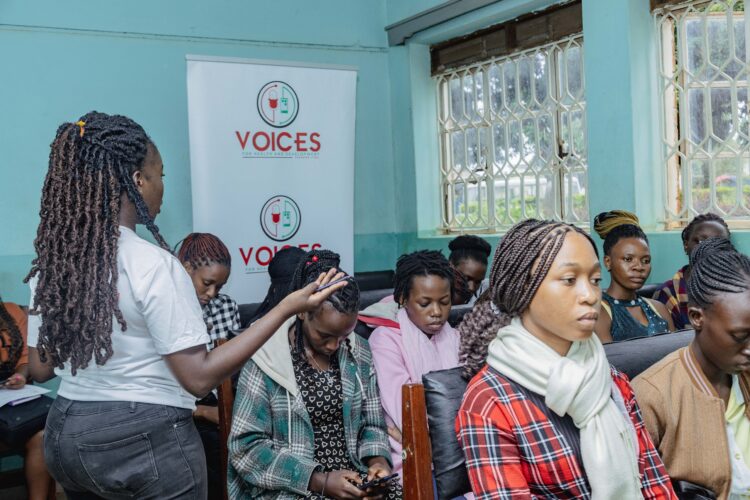Mary Akurut
A research initiative focusing on Sexual and Reproductive Health Rights (SRHR) and gender-based violence in university spaces was highlighted at a gathering held on 7th May 2025 at Nkumba University.
The event, attended by about 40 students, was spearheaded by Apio Julie, team leader at Voices for Health and Development and Changing Lives, a non-governmental organization dedicated to empowering girls and women.
The gathering brought together students, particularly female attendees, to discuss pressing issues affecting them on campus. According to Apio Julie, the organization aims to create a world where every girl is free from any form of violence as she shapes her own destiny. “Our mission is to break barriers and inspire girls and women to achieve their full potential,” she said.
During the session, students highlighted some of the SRHR issues they face, including mental health problems, menstruation challenges, gender-based violence, ignorance, irregular menstruation, and abortions. Apio Julie emphasized the urgent need to address the hidden struggles many university students face, especially the girl child. “We cannot ignore the realities of gender-based violence and the gaps in SRHR education,” she said. “Our goal is to equip young girls and women with knowledge and to foster spaces where they feel safe and supported.”
The discussion revealed that many victims suffer in silence due to stigma and lack of adequate support systems. Apio Julie urged students to work collaboratively to dismantle the barriers that hinder reporting and access to justice. “A girl should be confident with herself no matter what,” she added.
Students shared personal reflections and key takeaways from the session. Princess Amliah noted, “I’ve learned that knowing my rights is the first step in protecting myself and helping others because it’s really hard to get help from school authorities at times.” Nakalembe Majorine added, “Today, I understood the importance of speaking out and supporting fellow girls who might be victims of violence. Silence only empowers the perpetrators.”
The session highlighted the need for continuous education and awareness campaigns within universities. Achola Tina, another student, said, “Many of us didn’t even know where to seek help before today. I now realize the power of solidarity among women and the importance of having organizations like Voices for Health and Development and Changing Lives.”
Some students shared personal experiences, including Nigesa Olivia, who narrated a friend’s story of undergoing an abortion without proper guidance, which almost led to her death. Following the discussion, students proposed solutions, including health awareness projects on campus, better information systems, and peer-to-peer discussions.
As the session concluded, Apio Julie reiterated the organization’s commitment to keeping the conversation going and pushing for policy changes that will protect and empower female students. “We shall be looking for an Ambassador in our next meeting, so strive hard to understand what the organization does,” she said.
The research initiative is expected to inform future advocacy efforts and inspire more young women to become champions of change within their communities.
According to the African Women Development and Communication Network, Uganda still faces some societal, governance, and physical barriers in the accomplishment and protection of sexual and reproductive health and Rights. Achieving sexual and reproductive health and rights, encompassing the ability to decide when and whether to have children, is essential for the health and well-being of all women. Yet recent data indicate serious gaps in sexual and reproductive health services for adolescent women in Uganda.
The report also indicates that an estimated 649,000 women aged 15–19 in Uganda are sexually active and do not want a child in the next two years. However, among this group, more than 55% have an unmet need for modern contraception, meaning that they either don’t use the contraceptive method or use a traditional method of contraception. Moreover, many adolescent women who give birth each year do not receive the vital components of maternal and newborn care. Hitherto, the barriers in governance, such as restrictive policies and laws, corruption, and the inability to properly uphold laws over citizens, and societal barriers stemming from historical, religious, and traditional circumstances, provide significant hindrances in assuring sexual and reproductive health rights.



















Discussion about this post